- Home
- K. M. Ashman
A Wounded Realm Page 14
A Wounded Realm Read online
Page 14
‘Enough distraction,’ roared Magnus, ‘give the signal to beach the boats, it is time to test their mettle.’
Backs bent to the oars and within moments the ships ploughed forward, powered by men who had grown up in such circumstances. The Viking archers doubled their rate of fire, seeking not individual targets but keeping up the pressure to disrupt the enemy lines as the ships neared the shore.
Montgomery cantered his horse along the defending lines encouraging his men.
‘Here they come!’ he roared. ‘We will meet them head on amongst the surf while they lack organisation.’ He drew his sword and held it high. ‘Take heart, men of England – be true to your comrades and follow my lead.’
As the ships neared the shore, Montgomery peered over the edge of his shield and could see the bloodlust in the faces of the Vikings. Above the noise of his own army, he could hear the rhythmic beating of the enemy’s weapons against the hulls of the ships, a sound that had sent fear into the hearts of men for hundreds of years.
‘Let them come, men!’ he roared. ‘But fear not for this is a day that—’
His rallying call went unfinished as his head flew sharply backward and he fell slowly from his horse, an arrow protruding from his eye.
Silence fell upon the ranks as each man stared in confusion at the twitching body of their commander. Within seconds their nerve started to break and they looked around in fear, seeking guidance from their sergeants.
Up on the slopes, Robert of Rhuddlan looked on in horror as the bows of the ships beached on the shingle, their speed and force driving them high onto dry ground. Immediately, the occupants poured over the sides into the surf and ran forward a few paces before lining up to present a shield wall towards the defenders.
Robert was at a loss. It was too late to get down to take command and he knew that without coordination, the irregular soldiers would lack cohesion and the ranks would fail. With lead in his heart he realised there was nothing he could do and the front lines of the army were on their own. He turned his horse and galloped back into the vale, knowing his only chance was to muster the cavalry and strike before the battle was over.
Magnus Barefoot stood behind his men, his magnificent beard hanging low to his chest. In one hand he held a small round shield while the other wielded his trademark battleaxe. He had seen Montgomery fall and knew it was an advantage he could only have dreamed of, for these people were mainly peasants brought in to fight the battles of the nobles, while his own men had learned the way of war from an early age. He also knew that without leadership the enemy would be lambs before wolves.
He pushed through to the front and stared at the enemy lines. The shouts of the sergeants echoed across the shore as they tried to regain the discipline of their command but it was too late, the sight of Montgomery being killed was too much and within moments, some of the defenders broke ranks to run back towards the perceived safety of the dunes at their backs. More followed and soon confusion reigned as fighting broke out between some of the defenders, desperate to escape the imminent Viking onslaught.
This was the moment Magnus had waited for and he looked over at the Welsh lines formed up on his left flank, headed by Gruffydd ap Cynan.
‘Well,’ roared Magnus, ‘this is what we came for. Welshman, what are you waiting for?’
Gruffydd grinned and drew his own sword. ‘Our homeland lies before us, men,’ he responded, ‘let us wash it clean with English blood.’
With an almighty roar, the Welsh exiles charged across the shore to meet the defending English. Magnus and his own men shouted their battle cries and joined Gruffydd in the assault.
Within moments they crashed into the Englishmen, but rather than meet a solid line of steel, the enemy ranks were loose and uncoordinated. Immediately, the Vikings made inroads and the defenders were torn apart by the ferocity of the assault. From then on, the enemy was doomed and as they fought desperately for their lives, Gruffydd’s Welsh infantry fell upon their weaker flanks, rolling up the enemy defences with ease. The result was inevitable and knowing the battle was lost, the English broke ranks, an action as catastrophic as it was stupid.
Up on the hill, Robert of Rhuddlan had returned with his cavalry, but he soon realised the hopelessness of the situation, and that to commit more men to the fray would only result in further English losses. The battle was lost and the occupation of Ynys Mon short-lived. He would gather whatever survivors he could and along with the rest of the army still waiting back in the vale, retreat to the straits as fast as possible, all the time hoping the Norsemen failed to follow.
Decision made, he wheeled his horse and galloped back the way he had come, the screams of his dying fellows still ringing in his ears.
Down on the beach, Gruffydd looked across to Magnus, taking in the gruesome sight. The Viking leader stood legs apart with one hand holding his bloodied axe skyward. In the other hand, he held the head of one of the defenders, the blood still pouring from the severed neck as the Norseman roared out his battle cry.
‘Magnus,’ shouted Gruffydd, sheathing his sword, ‘the day is ours, call off the men.’
For a second there was no reply but slowly the chieftain turned and gazed unseeingly into the eyes of the Welsh king.
Gruffydd caught his breath, hardly recognising the man who had sailed with him from Ireland. The Viking’s features were contorted with rage and his mouth dripped with blood where he had torn apart an opponent’s throat. His eyes possessed a manic stare and the berserker bloodlust was obviously still upon him.
‘What did you say?’ growled Magnus eventually.
‘The battle is won, there is no point in continuing the slaughter.’
Magnus’ eyes narrowed as he considered the request. ‘Are these men not your enemy?’
‘They are,’ started Gruffydd, ‘but—’
‘Have they not invaded your lands and killed your kinsmen?’
‘Yes, but—’
‘And did we not make a pact that my men would rid these lands of their stench on your behalf?’
‘We did—’
‘Then hold your insults, Welshman, and let us do what it is we do best for if I deny my men the killing, they may well seek it elsewhere, perhaps amongst the ranks of your own.’
Without waiting for an answer, he discarded the head and stepped over the body before racing towards a skirmish involving several of his men against a group of determined defenders.
Gruffydd watched him go and although the Welsh king was himself a feared warrior, he had never seen any man fight as did the Norsemen. The brutality was unrelenting and every man who stood against them was cut down without mercy. Soon the sounds of battle fell away, but were immediately replaced with the roars of Viking victory.
Gulls and crows paraded along the edge of the dunes finding rich pickings of warm, bloodied flesh as Gruffydd mustered his men to count the cost of the casualties sustained.
‘Twenty of our own dead, my lord,’ said one of his sergeants, ‘and as many wounded. Three won’t see the day out.’
‘And the Irish mercenaries?’
‘Ten won’t see another dawn. Their fellows are taking them back to the ships as we speak.’
Gruffydd nodded silently. In the circumstances it was a small price to pay. He looked across to the Norsemen. Already they were building fires for their own dead while others were rolling barrels of ale down gangplanks for the funerary celebrations. They were indeed a strange people and absolutely fearless in warfare. He hoped he would never have to meet them on opposite ends of a battlefield.
As he watched, Magnus Barefoot approached, his blood-spattered face now calmer in the aftermath of the fight.
‘The fight went well, Welshman,’ said Magnus, ‘the gods will feast in our name this night.’
‘I’m sure they will,’ said Gruffydd, ‘and you have our gratitude.’
‘Gratitude does not weigh down a man’s purse,’ replied Magnus, ‘at least not on the day of the fight.’ He looke
d around. ‘Some of my men already drink in the halls of Valhalla as we speak, each of them dead in your name, but they died an honourable death with a blade in their hand and I envy their glorious end. However, make no mistake – I will hold you to the oaths we shared across the sea and will expect them to be fulfilled.’
‘My word is my bond, Magnus,’ replied Gruffydd. ‘One year from now send a ship to these shores and the first payment will be waiting. In addition, any ship bearing your banner will be granted safe harbour in my kingdom for as long as I live.’
Magnus grunted and looked towards the far hill where the remnants of the enemy were disappearing over the brow.
‘Many make their escape, Welshman, but we will hunt them down until the last have fed the soil with their blood or have fled across the straits to the mainland. But that is a task for the morrow. First we will honour our dead and drink to the gods.’
‘I thought your men were Christian souls?’
‘Some are and some still follow the old gods, but either way, it is good to have many such options, don’t you think?’
‘There is but one god, Magnus, and he is all-powerful.’
‘Was it the Christian god who lay this English army before us like lambs to the slaughter, Welshman?’
‘It was his will.’
‘And what about the arrow that felled their leader before an axe had been thrown, surely it was guided by the hand of Thor?’
‘Everything in this life is at the whim of the Lord God, Magnus, and you would do well to remember such a thing.’
‘Perhaps so, Welshman,’ said Magnus, ‘but I am a pragmatic man and will leave my final decision in such matters until my death is imminent. Now, I must go and honour my fallen brothers. Tomorrow we will cleanse your lands alongside you but today we feast. Go and say your prayers to your one god, Welshman while we celebrate ours with wine, fire and blood.’
Windsor Castle
July 6th, AD 1100
After Gwladus had left Windsor, Nesta had gradually allowed herself to become closer to Henry and soon began to live the life of a favoured courtesan at the Castle. Despite her Welsh loyalties, over the following six months she had fallen in love with the king’s brother, and although she knew she could never be Henry’s wife, he had given her a beautiful house where she enjoyed every privilege she could imagine, short of being a queen. Though she missed her mother and Wales, she had become content with her life. Her household staff were many, she enjoyed favoured seating at all court functions at Westminster and even the king himself talked to her on a friendly level, knowing how important she was to his brother. She spent her days running Henry’s affairs at home and though he was often away, many nights he shared her bed as the lovers they had become. It was on one such night when Nesta woke from a fitful sleep to see the king’s brother staring out of the window into a stormy night sky.
‘Henry,’ she said quietly, ‘does something bother you?’
Henry turned and smiled at the woman he loved.
‘No, my sweet,’ he said, ‘I just can’t sleep. Close your eyes and I will join you presently.’
Despite his request, Nesta rose and, tying a nightgown around herself, joined Henry at the window. She stood behind him and wrapped her hands around his chest, holding her lover tightly within her embrace.
‘I will not sleep knowing something plays on your mind,’ she said. ‘Share your concerns, my love, and perhaps I can offer clarity from a distance.’
‘Alas, these concerns are not for sharing, Nesta, for they are the burdens of royalty.’ He turned to face her in the darkened room, lit only by the ornate fire pots glowing red in each corner. ‘Nesta, you know I love you more than any other woman alive.’
‘So you say.’ Nesta smiled mischievously.
‘I am being serious,’ said Henry, ‘and it is important that you know that.’
‘Of course I know it,’ said Nesta, taking his hand, ‘and would have departed this place long since had I thought differently.’
‘You also know that if I could, then I would make you my wife without hesitation.’
‘That is a subject that perhaps we should avoid, my love, for I see no reason we cannot be joined.’
‘You know why,’ said Henry, ‘my brother would never allow it.’
‘Your brother will not live for ever,’ said Nesta, ‘and should you outlive him, then one day I can truly sit at your side.’
‘Perhaps,’ said Henry, and he once more stared out over the darkness of Windsor. ‘Nesta,’ he said eventually, releasing himself from her embrace, ‘I have to go. I have promised to meet my brother in the New Forest two days hence and share the hunt.’
‘It does not take two days to reach the lodges.’
‘I know, but there is some other business I have to attend to on the way, so I would benefit from an early start.’
‘And what business would this be?’ she asked, gazing into his eyes.
‘Just the business of men, Nesta, but worry not, I will return in a few days and arrange some quality time together.’
Henry turned and gently brushed a lock of her hair from her forehead.
‘You are a special woman, my love,’ he said. ‘And I am lucky to have you.’
‘Yes, you are,’ said Nesta with a smile and she tiptoed up to kiss him on the lips. ‘Be safe, my love, I will count the breaths until you return.’
Henry smiled and after another lingering kiss, left her alone in her bedchamber. An hour later she heard his horse trotting across the courtyard and she looked out of the window, catching his eye as he rode out between the gatehouses with a patrol of his personal bodyguards.
Two days later, Henry sat astride his horse alongside many of the royal household in the village of Brockenhurst in the New Forest, an area of woodland favoured by the king. Beaters with dogs had already been sent out on a circuitous journey into the forest to scare the deer herds towards the king’s party. Everyone drank hot ale to take the chill from their bones.
‘An interesting flavour, brother,’ said Henry, as the riders waited for the signal to start.
‘Indeed,’ said Rufus, ‘the kitchens have added eastern spices to provide a kick.’
‘Well, I hope we are as successful in the hunt,’ said Henry, ‘for the result is as hot as the devil’s hearth.’
‘Both men sipped on their ale, until Rufus spied a noble standing alone to one side.’
‘Isn’t that Lord Tirel?’ asked the king, ‘I thought he was abed with an illness.’
‘He looks fine to me,’ said Henry.
‘I am pleased,’ said the king, ‘for it provides me with an opportunity to have some fun. Come, let us see if he is agreeable.’ He turned to a nearby squire. ‘Bring me the package attached to my saddle.’
As the squire ran to the nearby horse, the king and his brother approached the nobleman standing alone to one side.
‘Lord Tirel,’ said the king, ‘a very good morning to you.’
‘And to you, my lord,’ responded Tirel.
‘Are you well? I heard you were indisposed only a few days ago.’
‘Indeed I was, sire,’ said Tirel, ‘but angels have surely smiled upon me for I would have been sorely disappointed to miss this day.’
‘Well, I am happy you are here for your reputation as a bowman precedes you and I would have sport with your prowess.’
‘I’m not sure what you mean, sire,’ said Tirel.
The king turned to the returned squire who handed him a leather wrap.
‘This was a gift from my father when I was a young man,’ said Rufus, turning back around and undoing the strap. ‘It contains six arrows from the finest fletcher in France. It is said that even the blindest man with poorest bow would hit their target if these be their shafts. Of course, I hold no time for such foolishness but as there is a wager as to who brings down the first stag, should I be the victor then there would be many cries of witchcraft and sorcery amongst my retinue.’
Several vo
ices raised in laughter from the king’s nearby courtiers.
‘Quite right too.’ Henry laughed. ‘For you need no help from bewitched arrows, brother, your aim is truer than any man here.’
‘Nevertheless,’ announced Rufus, ‘I will not be accused of unfair advantage. Walter Tirel, you are an archer of great note and I say to you: to the good archers, the good arrows.’
He handed three of the arrows to Tirel, who examined them closely. They were as light as a feather yet carved with tiny images of prey animals wrapped around the shaft. The bodkins were made of silver and the pure white feathers were from the wings of a snow goose.
‘They are indeed beautiful,’ said Tirel, ‘but I cannot accept, sire; they are gifts from William himself.’
‘Nonsense,’ said Rufus, ‘I have been anticipating this hunt for many days but seek fair competition. Accept the gift, Lord Tirel, and do the best you possibly can to outhunt me. Drop the first stag and ten pounds of silver will be yours.’
The group gasped at the generosity and turned to face the noble.
‘And if I lose?’ asked Tirel.
‘There will be no comeback,’ said Rufus jovially, ‘except for my constant teasing for many years to come.’ He laughed out loud at his own joke, as did his followers. ‘So, what say you?’ asked Rufus when the laughter had died down. ‘Do we have a wager?’
Tirel glanced at Henry before turning his attention to the king.
‘Aye, my lord, we do.’
‘Excellent,’ shouted Rufus. He turned to find the hunt master. ‘Lord Grayling, if there is nothing else, we are ready to begin.’
‘Aye, my lord,’ came the reply, and to the sounds of horns echoing across the misty fields, King William Rufus led his party into the New Forest.
The morning’s hunt was unsuccessful, with only a boar brought down and when they finally stopped to eat at midday, conversation was muted. Spirits rose only when the news came in they had all been waiting for.
‘Sire,’ shouted Lord Grayling, ‘there is talk of a ten-point stag less than a league from here.’

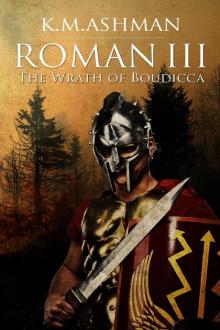 The Wrath of Boudicca
The Wrath of Boudicca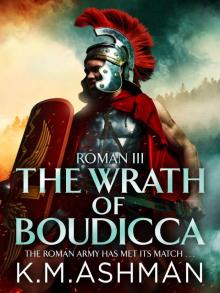 The Rise of Caratacus
The Rise of Caratacus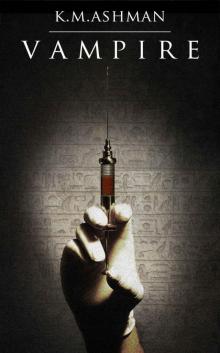 Vampire
Vampire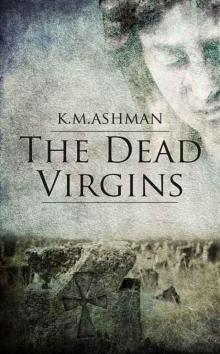 The Dead Virgins (The India Sommers Mysteries Book 1)
The Dead Virgins (The India Sommers Mysteries Book 1)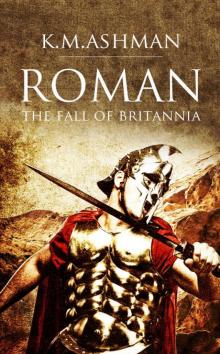 Roman - The Fall of Britannia
Roman - The Fall of Britannia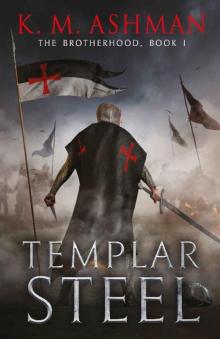 Templar Steel
Templar Steel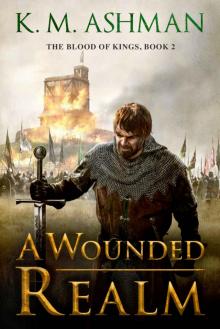 A Wounded Realm
A Wounded Realm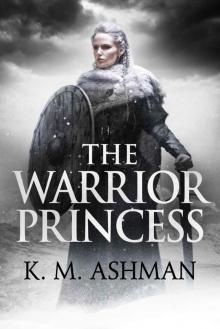 The Warrior Princess
The Warrior Princess